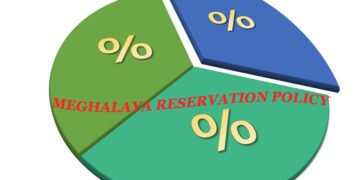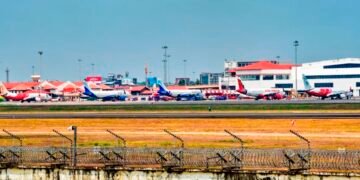The surge in drug addiction among the youth in North East India has reached alarming levels, primarily due to its proximity to the Golden Triangle, a notorious region for drug production and trafficking. States like Assam, Meghalaya, Tripura, Manipur, and Nagaland have become prime targets for drug peddlers, exacerbating the problem of substance abuse in these areas.
A UN report highlights that drug trafficking across the border of Myanmar and the northeastern states of India—Manipur, Mizoram, and Nagaland—occurs with significant ease, featuring dimensions such as the illicit cultivation of opium and cannabis, the smuggling of heroin and amphetamines from Myanmar, and the trafficking of pharmaceuticals like dextropropoxyphene and codeine-containing cough syrups, along with ephedrine and pseudoephedrine precursors for amphetamine production.
The region’s drug issue is exacerbated by a severe HIV epidemic, with Manipur and Nagaland experiencing a generalised epidemic strongly linked to injecting drug use, and Mizoram showing signs of a similar trend. Furthermore, non-injecting sexual partners of drug users are increasingly contracting HIV, underscoring the urgent need for comprehensive interventions. (United Nations Office on Drugs and Crime. Executive Summary Drug Use in North-Eastern India)
The report also mentions that Assam and Meghalaya, two north-eastern states, do not border Myanmar. Meghalaya, known for its reputable educational institutions, draws students from across the North East and is well-connected by road to Guwahati, Assam’s capital, and Aizawl, Mizoram’s capital.
These extensive road networks enable the transport of synthetic pharmaceuticals like dextropropoxyphene between Meghalaya, Assam, and Mizoram. Meanwhile, the states that share a border with Myanmar — Manipur, Mizoram, Nagaland, and Arunachal Pradesh — have experienced heroin trafficking across their borders.
Drug addiction is a multifaceted issue with devastating consequences for individuals and society. It adversely affects the physical and mental health of those involved and leads to significant social problems, crime, and economic burdens on the state.
Combating drug addiction requires a comprehensive strategy encompassing prevention, treatment, and rehabilitation. Raising awareness among the youth about the dangers of drug abuse, providing access to education and alternative activities, and offering support and treatment for those already struggling with addiction are essential components of this strategy.
The global community is increasingly alarmed by the escalating tide of drug abuse and illicit trafficking, which wreaks havoc on individuals, families, and societies worldwide. The scourge of drug addiction transcends borders and cultures, affecting both urban and rural communities.
International reports indicate that the illicit drug trade has become a multi-billion-dollar industry, fuelled by criminal organisations like narco-terrorism, which operate with impunity across continents. The devastating consequences of drug abuse are felt in social instability, economic development, and national security.
A primary challenge faced by the international community is the cross-border trafficking of drugs, facilitated by sophisticated networks that exploit vulnerabilities in law enforcement and border control systems. Countries like Thailand, Myanmar, and Laos are major hotbeds of illicit drug production and trafficking, supplying a significant portion of the world’s illicit drugs.
The impact of drug abuse is profound, leading to a wide range of health issues, including addiction, mental health disorders, and infectious diseases like Hepatitis, Tuberculosis, and HIV/AIDS. It also fuels crime and violence, destabilises communities, and undermines the rule of law. The most vulnerable populations, including youth and marginalised groups, are often the hardest hit by the consequences of drug abuse.
Efforts to combat drug abuse and illicit trafficking require a coordinated and comprehensive approach at the international level. Cooperation between countries, law enforcement agencies, and international organisations is essential to disrupt drug trafficking networks.
Community-based awareness programmes, counselling services, rehabilitation centres, and support groups can play a crucial role in helping individuals recover from addiction and reintegrate into society. Collaboration between government agencies, law enforcement, healthcare providers, NGOs, and other community organisations is vital to addressing this issue effectively.
It is crucial to address the root causes of drug addiction, such as poverty, lack of opportunities, social pressures, and mental health issues. By tackling these underlying factors and offering support and resources, we can decrease the incidence of drug addiction and create a healthier and safer community for future generations. Remember, recovery is attainable with the proper support and resources. This emphasises the urgent need for increased observation and intervention to combat drug abuse and illicit trafficking in these regions.
The International Day against Drug Abuse and Illicit Trafficking, known as World Drug Day, is observed annually on June 26 to bolster efforts and cooperation in achieving a world free from drug abuse. The theme for 2024 is “The Evidence is Clear: Invest in Prevention,” emphasising evidence-based approaches to prevent drug abuse and illicit trafficking.
(The writer is an Assistant Professor in the Department of Human Development and Family Studies, College of Community Science, Central Agricultural University (Imphal), Tura, Meghalaya. He can be reached at email id: hnarmada@gmail.com)



























